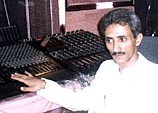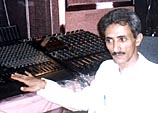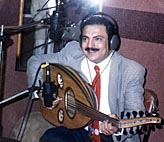
Hassan Qassim Al-Zubairy: “I wish to further develop my studio so it may, one day, rise to world standards.” [Archives:1999/22/Interview]
May 31 1999
Hassan Qassim Al-Zubairy is one of the few Yemeni professionals who have contributed much to the growth of music and stage performances in Yemen. Although Hassan was unable to complete his academic studies in the field of sound engineering at the University of Cairo because his scholarship was cancelled during the Iraqi invasion of Kuwait, he dedicated himself to working in this field with the knowledge he had gained.

He started by working for the national TV in 1990. He was the principal figure behind the annual “Ramadhan Children’s Contest” program on Yemeni TV.
But soon, he discovered the government sector was not for him, given the many constraints. He wanted his free spirit to fly, and to try new ideas. He moved to Taiz, where he built a small studio for recording songs and oral plays. Last year, he moved to Sanaa.
Mohamed Bin Sallam of Yemen Times visited Zubairy at his work place to learn more about his work, his contribution, his future plans, and the problems he faces.
Excerpts of their talk.
Q: How would you describe your line of business?
A: Basically, I develop music and record the singing of various talented musicians. When a promising young man or woman feels he/she has something to offer, we get together and check it out. For that purpose, I have constructed the first up to-date sound-proof studio ever to exist in Yemen.

A: I don’t know exactly. I can tell you that no professional Yemeni musician has made it without passing through my studio.
Since establishing the studio, I have produced more than 150 songs for both male and female Yemeni singers. I have also done a lot of TV work, such as the Ramadhan Children’s Contests, TV and radio series, and national songs.
Q: How did this entire music studio project start?
A: It started with some simple recording machines and equipment. We used the radio studio to record songs. The task was very hard and awkward because in order to record a song, we had to gather all the people who take part in the song Ð drummers, pianists, flutists, oud players, singers, chorus, etc. – at one time to record the song live. If a mistake occurred, we had to go back and do it all over again from square one. On the other hand, today when recording in my studio, we can simply record each instrument separately. If there is a mistake, we redo a small part of one piece. It saves much time and effort. It is also amazing that one person can sometimes be the whole orchestra if he/she can play the various instruments involved. Let me give you an example. How many people do you think perform in the Ramadhan Children’s Contest? Believe it or not, it is the work of just one person!
Q: How many people work with you in the studio?
A: I have my own musical team consisting of 8 talented musicians who play various musical instruments. They have no formal training. They began their career in the local arena, depending on available local facilities. Like me, they are self-trained.
I also have another sound engineer as my assistant.
Q: Do you do all your work in this studio?
A: Actually, I started the studio in Taiz, Yemen’s most intellectual city. But six months ago, I decided to come to Sanaa, the capital city, which is a much larger market.
Q: How much investment have you put in your present studio?
A: It cost more than 8 million Rials. I financed the whole project with my own money. If I had had more resources available to me, I would have done wonders. I have not benefited from what is called the investment law or any other incentives.
Q: How many cassettes have you recorded now?
A: I cannot count at the moment because all Yemeni singers who have established themselves in this market actually do not know any studio other than mine. They all had their cassettes recorded here.
Q: How do you usually discover talents?
A: I really don’t know, it just happens. I have no system.
Usually, the singer who wishes to show me some of his/her singing contacts me. I always have time to listen, and then evaluate. If I see his/her talent as promising, I immediately make contact with one of the music production companies.
Today, there are around 21 such companies that provide financial support, and undertake distribution marketing job.
But production companies often do not make much money. It is a big risk.
Q: Why is that?
A: Unfortunately, there is no respect for patents or copy rights in this country. The Ministry of Information is not doing its job in this.
Yemen is one of the few countries in the whole world which does not protect the rights of writers or artists. There is no law that forbids the duplication, reproduction or imitation of artistic work.
There are times when thousands of copies of a new song are made and sold on many cassettes. These are sold in stores without the knowledge of the original author.
Abroad, there are strict rules that prohibit this. Duplicating a cassette for the purpose of selling it is considered a crime punishable by law. In Cairo for example, there was an incident when one imitation copy of a new song was discovered by the Ministry of Information. The store was closed down.
This way, the rights of the author, singer, producer, and everybody else, including the buyer, are protected.
We are in a country with a population of 18 million. If a singer is able to sell 100,000 copies of a cassette tape, with a profit of 5 rials per copy for the singer, he/she will get around 500,000 rials of income. This is good income, and this sector will flourish. What happens in reality is that the income to the singer is around 40,000 rials – less than 10% of the expected income. Most of the money actually goes to music stores, which have illegally duplicated hundreds or thousands of copies. This is truly shameful.
Q: Where are the legal copies being made?
A: Every music production company has its own cassette copying machines. We are studying a proposal of having a joint official cassette printing house which will be ultra modern, and which will allow consumers to tell which is the original version, and which the cheap duplicate.
Q: What is the cost of producing a music cassette?
A: The rental costs for registering a cassette tape vary from as low as YR 35,000 (about $ 230) to as high as YR 300,000.
Q: How many talented young singers make it every year?
A: The number varies from one year to the next. I can say that the annual average is around 10 new singers. It is worth noting that only a very small fraction of the Yemeni singers are female. The musical arena is dominated by male singers.
Q: Why is that?
A: I think it has to do with our culture. It is sad to note that whenever a new talented female singer comes to the spotlight, she stays visible for a very short time. Within a few years, sometimes months, she disappears. I do not know what the reasons are, but maybe social pressure forces them to shun the spotlight.
Q: How many professional singers are there in Yemen today?
A: There are many singers, but the real professional ones are few.
You see, the Yemeni market is quite fragmented along main lines of dialects.
That is why any Yemeni singer who sings in the formal (classical) Arabic language hardly sells any copies. You have to sing in the local dialect for people to identify with you and buy your songs.
Q: What is the common dialect that sells the highest number of copies?
A: As I said earlier, the market is fragmented. Every area has its own dialect, and hence its own singers. For example, in the Sana’ani dialect, Fuad Al-Kibsi stands out. For the Taizi dialect, there is Abdulghafoor Al-Shameeri, Ahmed Mahyoub, Abdulbasit Absi, and most famous of all, Ayoub Tarish.
In Aden, Ja’afar Hassan Qufl, stands out. Of course, there are many more such as Abood Khawaja, who has one of the most beautiful voices I have heard from Aden. We also have Awadh bin Sahib who is quite promising. However, we also have old but respected singers from Aden such as Badwi Lazubair, who is a well-known singer in his region, but unfortunately he has yet to become known on a national level.
Q: We saw that the famous singer Ibrahim Hussein is in your studio at this time. Where does he stand?
A: Ibrahim Hussein is a talented singer. In fact, he is in a class of his own. He gave a lot to the singing profession in Yemen and he hasn’t gotten much back from it. He is a person who has sacrificed a lot to improve the arts.
Q: Are there surprises in this business?
A: Yes, of course, there are surprises. For example, we pass judgement on what will sell well, and what won’t. Sometimes, our judgement can be so wrong.
An example of that is the tape of Ali Innaba who surprised us all with the sale of 300,000 tapes in the market in a short time. This is the official number. If you add the illegal copies that must have been sold, you will have an even higher number.
On the other hand, there are professional singers who were not very successful and sell a disappointing number of tapes. Yemenis mostly favor the rural type of songs, because most Yemenis live in rural areas. I suppose this explains the high sales of Ali Innaba.
Q: At the end of the interview, would you like to add anything?
A: I hope that my country can develop in all sectors, including music. This is a field in which we can excel. It is also an important foreign currency earner, if properly developed.
I also hope that the private sector will invest in music producing companies. These need to grow bigger and become more independent.
I also wish that our parliament would enact laws to protect the rights of artists and production companies. Finally, I hope to further build and develop my studio so it may one day rise to world standards.
——
[archive-e:22-v:1999-y:1999-d:1999-05-31-p:./1999/iss22/intrview.htm]


